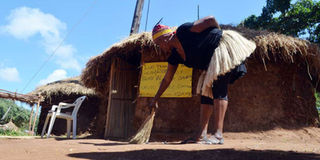Costly African culture hindering economic growth

A woman sweeps outside a Luo traditional hut during Mombasa International Cultural Festival in Mombasa on August 17, 2015. PHOTO | KEVIN ODIT | NATION MEDIA GROUP
What you need to know:
- Among the nomadic communities, a man has no honour if he has no considerable herd.
- Perhaps the most disturbing culture is that of treating women like second degree citizens.
- The African heritage is rich in communal well being and wholesome development.
An average Luo man builds four different houses in his lifetime. First is the simba; a bachelor’s hut. Upon marriage, he is expected to build his matrimonial home in honour of his new wife.
Yet a man in his father’s homestead cannot be an elder, he remains a boy even if he is gray. He is thus expected to leave his father’s home and put up a homestead in his name.
In the new homestead, he first builds a small, temporary hut to fend off evil spirits. The hut is built on the edges of the homestead and is styled od ligala. After a while, he then puts up a majestic house at the top centre of the homestead, facing the gate. Should the man have more than one wife, each wife is entitled to a house, built on the wings of the main house.
Assuming voluntary labour, the average cost of putting up a mabati house in the village is estimated to be Sh50,000.
GRASS
Ancient building materials like grass and sisal fibre are now more expensive than corrugated iron sheets, timber and nails. In the event that the family had sufficient land, at least Sh150,000 used in the construction of the first three houses will be wasted money.
All this cost would make some sense if indeed one lived in the village. Sadly, this is not the case. About 45 percent of Kenya’s population lives in urban centres.
The houses being built in the village are simply for status and brief stay during funerals and at Christmas. The Kenyan middle class is caught up between culture and economics.
RENT
The Kikuyu culture is not so elaborate on housing. However, a man is not worthy to speak among men when he still pays rent.
If he, on the other hand, is receiving rent income, his social status gets even higher.
Buying a self-use residential house in Kenya is more expensive than paying rent. This is shockingly true whether one buys upfront or gets a mortgage.
One is better off saving that money with a sacco, getting a saving with an insurance company, buying shares, or land for speculation. But Kenyans will hear none of it. Mugunda reigns supreme.
Perhaps this explains why, against all advice of a possible bubble in the real estate sector, more investors still insist on putting up houses for sale and for rent. Billions of shilling that could otherwise be in productive circulation are thus converted to brick and mortar.
POOR
Among the nomadic communities, a man has no honour if he has no considerable herd. Never mind the fact that not many people have an eye for animal husbandry.
A friend of mine has a Master’s degree in law and enjoys great respect among his peers. Yet in Wajir, his home county, he cannot speak among men as he is ‘poor’.
Perhaps the most disturbing culture is that of treating women like second degree citizens. While the above hurdles put for men are difficult, they cannot compare to a woman, who even if she builds 10 houses in my village, cannot be recognised as a homestead.
FINANCING
Worse, in many communities they cannot own land and thereby cannot access financing from banking institutions.
The African heritage is rich in communal well being and wholesome development. A growing body of research indicates that Africa’s culture is a largely untapped resource that could give its economic development a welcome fillip, both in the creative and manufacturing fronts.
However, there are areas of this culture that are detrimental to social well being and economic development.
Odhiambo is an independent analyst. @Odhiamboramogi




